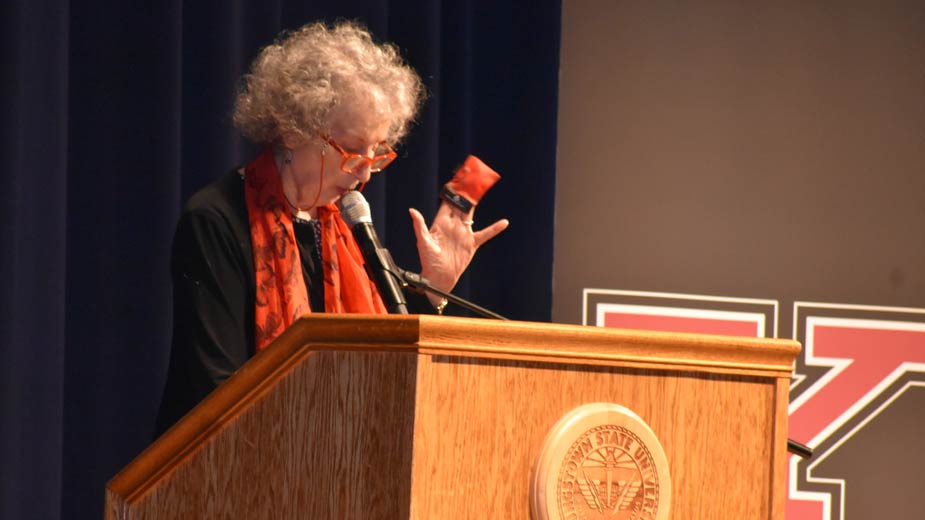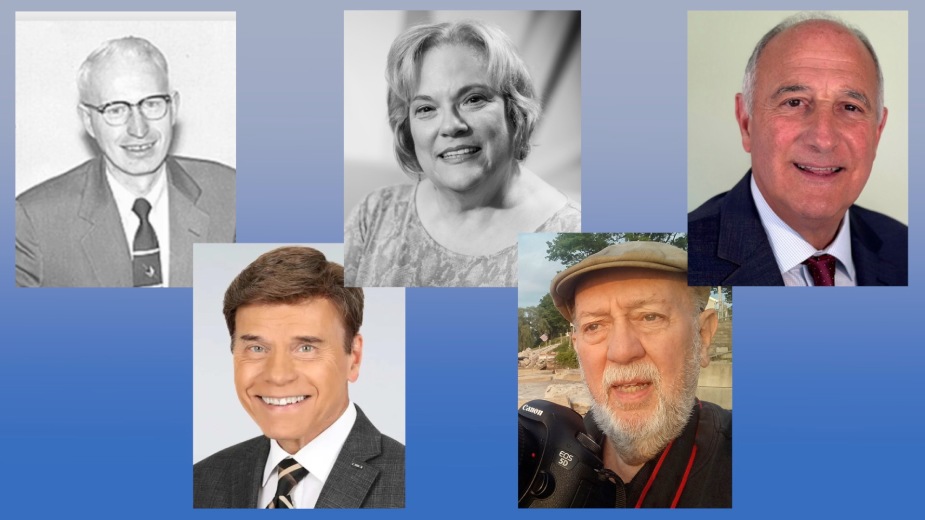Novelist Atwood Hopes Her ‘Tale’ Never Comes True
YOUNGSTOWN, Ohio – Margaret Atwood says her wish for her well-known dystopian novel, The Handmaid’s Tale, is what it’s always been – for it to remain a work of fiction.
Discussion of the novel represented much of the Canadian writer’s nearly 90-minute presentation at Stambaugh Auditorium Friday night as part of Youngstown State University’s Skeggs Lecture Series, where a surprisingly humorous Atwood shared her insights about her work and delivered a brief defense of the humanities during the program.
The Handmaid’s Tale, published in 1985, is a work of speculative fiction that details life in the former United States, now dominated by a repressive theocratic military dictatorship formed within its borders, the Republic of Gilead.
Under the new government, which is based on the Old Testament, human rights in general are restricted and women’s rights even more so, to the extent that women are unable to own property, vote or even read. Its protagonist and narrator is Offred, a handmaid placed in the home of a high-ranking official and his wife for the purpose of bearing a child for them.
“My next hope for this book? The same it’s always been,” she remarked. “I hope that The Handmaid’s Tale will remain between its covers, that it will not become a reality any more than it already is.”
The novel, Atwood said, poses this question: If America were to have a dictatorship, what form would it take? Religion would certainly be a major component, she offered.
“It was clear to me that America was not always a democracy,” she said in a mock-hushed voice that elicited laughter from the audience, one of several times she did so during the lecture. “It started as a theocracy.”
In the early 1980s, with the ascent of the Religious Right in the United States, there was already a “stream of talk about restoring something very much like a dictatorship” that emphasized the subordination of women, so she set out to write a book “in which America set out to return to its 17th century roots with a vengeance,” she continued.
“The dystopian society I proposed would contain no feature that human beings had not already put into practice somewhere or sometime, or that they lacked the technology for,” she recalled. All authoritarian regimes have had an interest in controlling women — particularly with respect to sexual activity and reproductive capacity, she pointed out.
As in all puritanical regimes, there is “an underworld where forbidden things may be had by the well connected,” she said. In The Handmaid’s Tale, Jezebels –women forced to become prostitutes and entertainers in state-sanctioned brothels — dress in sexualized clothing such as Playboy bunny costumes and cheerleader outfits, and are available to high-ranking officials and their guests.
“It’s what the naughty boys do behind the scenes and the naughty boys always do something behind the scenes in those regimes,” she said during an interview prior the lecture. “Scratch it and you will find it. It’s there.”
During one segment of the program, Atwood – using a makeshift hand puppet, which also amused her audience – portrayed a researcher from “several centuries” in the future of the novel’s events. The researcher, in responding to questions at an academic conference about his studies of “the Gilead Period,” offered commentary about the period that many see as having relevance in America today.
“From what we know about totalitarian, authoritarian and dictatorial regimes of those centuries, they were quite ruthless, and many went to extremes to liquidate perceived enemies and silence any opposition,” according to Atwood’s researcher. Those regimes thought nothing of shooting peaceful protest marchers, shuttering news organizations and using rape and other instruments as a means of control.
“If there was no true news, false news can be made very plausible,” Atwood – as her character – continued. “Many populations were led to believe these regimes were working in their interests or at least preferable to the alternatives.”
The Handmaid’s Tale, one of several works by Atwood, has frequently been a topic of discussion and reference in articles during the course of last year’s presidential contest and the election of Donald Trump. Trump is portrayed by his critics as unsympathetic to women’s issues based on his past comments regarding women and allegations of his treatment of them.
Many people voted for Trump – including many who would normally vote for Democrats — because they believed he would bring their jobs back, not because they were racist or sexist.
“They were economically deprived,” Atwood said. “A culture that was stable and they had taken for granted, had disappeared, and they associated that stability with the 1950s, with the era when you had four kids, a washer-dryer, and dad was the breadwinner. That was being pushed a lot because you needed to get the women out of the workforce where they had been during the war, and create space.”
The novel also is gaining new prominence because of an upcoming multipart adaptation that will be streamed on Hulu. Advance reviews of the series, which stars Elisabeth Moss as Offred, have been largely positive.
The novel, which earlier was adapted as a film starring Natasha Richardson, definitely benefits from the longer form, which allows the story to branch beyond the viewpoint of the novel’s narrator and show more of what happens with the other characters, Atwood said.
The producers are “bent on remaining true” to the story, she said. “The performances are amazing,” she remarked.
Atwood is serving as a consulting producer on the 10-part series. “They take you out to lunch and they tell you what they’ve already decided,” the author told students and faculty before to the lecture.
Atwood’s hour-long talk covered topics ranging from her novels and her craft to her talent for palm reading and her creation of a comic book character, Angel CatBird, which will appear in its third graphic novel this summer published by Dark Horse.
She lamented that authors are increasingly being asked by publishers – who used to handle the main promotion of books — to promote their work via social media.
“The author should just be in charge of writing the best book they can write,” she said. “They should not have to be a shill. It’s not a talent that everyone has.”
Asked by a student whether fiction writers have a responsibility to reflect society as it is or as they believe it should be, she responded that fiction writers can’t be told what to do any more than cat owners can be told what to do, and may do the exact opposite.
Artists know their interests, capabilities and passion, she continued. “If you try to tell them to do something else, it’s just not going to work, so they should do what they feel they’re called to do and put it out there. Then you can talk about whether you think it was the right thing or not. But you can’t tell them ahead of time unless you want to be Joe Stalin.”
She acknowledged she hadn’t kept her palm reading up to her past high standard, but said the talent remains “a good party trick” because people love to hear about themselves.
“If they’re nervous about something else, you can distract them by saying, ‘Let me see your hand,’” she said, which also drew laughs from the audience.
During the lecture, Atwood offered her defense of the humanities, which are under threat of defunding because they’re not believed to offer “things of financial value” that can generate revenue for investors.
“If you’re interested in human wholeness, the humanities must be engaged,” she said. “At weddings, funerals and other threshold moments in life. We don’t recite our income tax reports. If we recite, it’s likely to be poetry.”
Members of the lecture audience included travelers from across the state as well as those closer to home.
“I was impressed with the way she compared her book, which was obviously written quite a long time ago, and how it relates to what we’re dealing with now and how it fits into society,” said Paige Greene of Hermitage, Pa. She also enjoyed the author’s insights on the writing process.
“I’ve read all of her fiction books and a few of her nonfiction pieces,” said Andrea Bartels of Cincinnati. “I find her work really resonates, especially now in the climate.” She also was interested in the genesis of The Handmaid’s Tale, which Atwood began writing while in West Berlin.
Aimee Klingbeil of Sandusky, who has been “a big fan” since reading The Handmaid’s Tale, found Atwood “very charming” and “very clever.”
Tom Hull of Youngstown, who has read several of her books, was surprised by how funny the author was.
“If you would have asked me is she going to come with a fake puppet and do a little show, I never would have thought that,” he said.
Copyright 2024 The Business Journal, Youngstown, Ohio.



